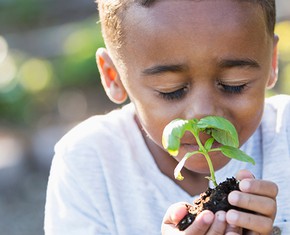The views expressed in our content reflect individual perspectives and do not represent the authoritative views of the Baha'i Faith.
The winds of the true springtide are passing over you; adorn yourselves with blossoms like trees in the scented garden. Spring clouds are streaming; then turn you fresh and verdant like the sweet eternal fields. The dawn star is shining, set your feet on the true path. The sea of might is swelling, hasten to the shores of high resolve and fortune. The pure water of life is welling up, why wear away your days in a desert of thirst? Aim high, choose noble ends; how long this lethargy, how long this negligence! Despair, both here and hereafter, is all you will gain from self-indulgence; abomination and misery are all you will harvest from fanaticism, from believing the foolish and the mindless. The confirmations of God are supporting you, the succor of God is at hand: why do you not cry out and exult with all your heart, and strive with all your soul! – Abdu’l-Baha, The Secret of Divine Civilization, p. 104.
Pop quiz: define the word “noble.”
If you said a noble is a member of a royal family, that’s absolutely right—but that’s only half of the definition. If you said noble also means having honorable qualities, you get an A+.
Sadly, the word noble, one of the great words in the English language, has fallen into disuse lately. We’re in danger of losing that beautiful and distinguished adjective. Can you even remember the last time you used the word noble to describe someone, or heard it used by anyone else?
I once had a great big Golden Retriever who had a particularly stately profile, a large head and a beautiful leonine coat of tawny fur. With a mane, he might have looked like a lion. People always said “What a noble-looking animal!” I think they said it, though, because he looked like the King of the Jungle, not because he had any particularly noble inner canine virtues. He even flunked dog obedience school.
The dictionary definition of noble—“having honorable qualities; having moral eminence and freedom from anything petty, mean or dubious in conduct and character”—might give us a clue about the word’s diminishing utility in so many of our cultures. Those character traits can seem like they’re in short supply these days. In some ways, we’ve gotten to the point where we no longer truly value nobility or honor.
So, give some thought to the word noble. Try to picture it. What comes to mind?
When we contemplate someone noble, we tend to think of a person who lives a life of high moral aims and ideals. I automatically picture people like Mother Teresa or Nelson Mandela, or the exemplar of the Baha’i teachings, Abdu’l-Baha. They all led noble lives, devoted to the well-being and freedom of others and based on high moral principles. They dedicated themselves to the progress of humanity and the alleviation of pain. They truly lived the spiritual, soulful acts of service they freely gave to others. They suffered, and their suffering had meaning, because they found ways to translate it into altruism.
With that definition as a benchmark, here’s my main question: do you think of yourself as noble? Have you chosen “noble ends” in life, as Abdu’l-Baha recommends? Do you “aim high?”
It does, I’ll admit, seem like a “high bar,” right? Few of us, if we have any humility, would characterize ourselves this way.
Strikingly, though, the Baha’i teachings tell us—each and every one of us—that we’re born as noble beings:
O Son of Spirit! I created thee rich, why dost thou bring thyself down to poverty? Noble I made thee, wherewith dost thou abase thyself? Out of the essence of knowledge I gave thee being, why seekest thou enlightenment from anyone beside Me? Out of the clay of love I molded thee, how dost thou busy thyself with another? Turn thy sight unto thyself, that thou mayest find Me standing within thee, mighty, powerful and self-subsisting. – Baha’u’llah, The Hidden Words, pp. 6-7.
Man, the noblest and most perfect of all created things, excelleth them all in the intensity of this revelation, and is a fuller expression of its glory. – Baha’u’llah, The Book of Certitude, p. 102.
Know thou that every soul is fashioned after the nature of God, each being pure and holy at his birth. Afterwards, however, the individuals will vary according to what they acquire of virtues or vices in this world. Although all existent beings are in their very nature created in ranks or degrees, for capacities are various, nevertheless every individual is born holy and pure, and only thereafter may he become defiled. – Abdu’l-Baha, Selections from the Writings of Abdu’l-Baha, p. 190.
Baha’is don’t believe in original sin or bad karma or inherited evil. Instead, the Baha’i teachings say that every human being comes into this world noble and pure. Anyone who has ever witnessed the birth of a baby understands that we emerge into this life as beautiful, undefiled souls.
Of course, babies tend to grow up into adult human beings who have free will, and who choose their own path in life. As Abdu’l-Baha says, “the individuals will vary according to what they acquire of virtues or vices in this world.” Each one of us has a combination of virtues and vices—and taken together, they determine our character. If virtues prevail, we become noble, selfless, altruistic and spiritual. If vices prevail, we can become less than noble:
How noble and excellent is man if he only attain to that state for which he was designed. And how mean and contemptible if he close his eyes to the public weal and spend his precious capacities on personal and selfish ends. The greatest happiness lies in the happiness of others. He who urges the matchless steed of endeavour on the race course of justice and civilization alone is capable of comprehending the wonderful signs of the natural and spiritual world. – Abdu’l-Baha, Star of the West, Volume 4, p. 133.
In this short series of essays on nobility, we’ll explore the human actions and characteristics that lead to a noble life. We’ll examine what it takes to achieve nobility in this world. Ultimately, we’ll look at the spiritual guidance given to us by all of the great Faiths about human nobility, and try to understand how we can follow that guidance.
Next: Have You Ever Met a King or a Queen?
















Comments
Sign in or create an account
Continue with Googleor